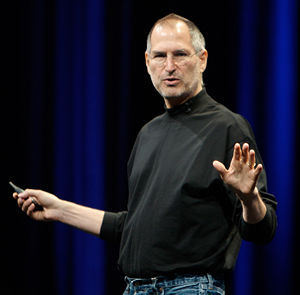A good friend of mine sent me an email commenting on the changes in Apple's Developer Program license for the 4.0 iPhone OS, and I decided to share my thoughts here, as my email grew to become the tome you see here.

- Image via Wikipedia
Apple has, as you've probably heard, indicated that it will allow apps on the iPhone and iPad only if they're written with Apple-native languages and tools, and it's widely-believed that this has been done as a form of anti-Flash "nuclear weapon", as my friend commented.
I'm not convinced that this move is directed only at Flash, though. Any third-party tool (MonoTouch, for example) will be impacted by this move. Some people have even speculated that this move is intended to help iPhone multitasking ("BS", I say -- write a damned API). While all of these things might be factors in this move, I believe that the fundamental driver here is a maniacal need for Steve Jobs to control the entire digital experience for his users; nothing short of this will be enough.
Apple isn't perceived among consumers to be monopolistic simply because they don't have a majority market share yet. The thing that just kills me about Apple right now, though, is that within their customer base, they're monopolistic to an extent that would have gotten Microsoft run out of town on a rail, even in its heyday.
- All functionality on these devices is approved by Apple.
- When rejecting an app or content, "because we said so" is sufficient reason.
- "We changed our minds" is enough to get an app pulled after approval -- including yanking it off any devices upon which it's installed.
- To get an app on your device, you have to go through iTunes.
- To build an app, you have to use Apple development products (for all intents and purposes).
- To use Apple development products, you have to be running a Mac.
That's a lot of kool-aide, folks, but if you think that's bad, it's going to get worse.[callout title=A benevolent monopoly?] Despite my ranting here, I can appreciate the benefits of a technology monopoly. The incredible growth of the PC platform was made possible mainly because of Wintel's near-monopoly -- it created a huge ecosystem for hardware companies, software companies, and consumers. But as much as that partnership was effectively a monopoly, they still let mice scurry around and fight over table scraps, and the table scraps were enough to keep a lot of mice fed.[/callout]
I got a new phone last week. Although I've experienced some teething pains, one of the most pleasant parts of the experience was spinning up my contact list and calendar. I pointed a new Exchange account at Nuevasync (which connects to my Google account), and sucked down all my contacts and appoinments at 3G speed. Easily the most painless phone transition I've ever experienced. This is what cloud computing looks like for the consumer.
Apple is building a gigantic data center in North Carolina. Care to take a guess why?
Data centers this size are being built today for cloud computing, almost exclusively. Apple is going to suck your entire digital identity into their brand-new data center, and you'll never see it alive again unless you keep paying your monthly ransom. As long as you play along, life will be wonderful, in a fuzzy, heavily-sedated way, but if you engage in nonconformist behavior (trying to get your data back, for instance), you should expect to be punished as you'd expect to punish any troublemaker.
Another friend of mine asked me the other day how he could get his DRM-protected music (bought on iTunes) off an old PC and onto his new one. This is a smart man, by the way - a successful businessman, and he'd tried to figure this out and was stumped. If you've ever tried this, I'm sure you can understand.
Take a good whiff, folks, because that's the experience we could be signing up for with all of your data.
I'll pass. How about you?
Related articles by Zemanta
- Adobe To Apple: "Go Screw Yourself" (cultofmac.com)
- iPhone OS 4 Developer Agreement Further Enforces Flash Ban (appscout.com)
- Silicon Alley Insider: Apple Boots Google Off iPhone 4.0 (AAPL, GOOG) (businessinsider.com)
- Apple v Adobe: this time it's executable (guardian.co.uk)

![Reblog this post [with Zemanta]](https://i0.wp.com/img.zemanta.com/reblog_e.png?w=525)